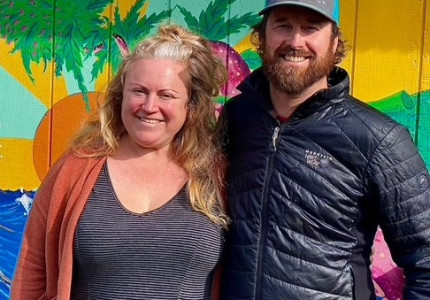The story of Josh and Yeins Chestnut, owners of Lost Paradise Organics is, at its heart, a love story. Their very rural farm on the Humboldt/Mendocino County line represents years of hard work which necessitated moving thousands of miles from Yeins’ native Costa Rica, building their own homestead and like their colleagues, struggling through the complex work of regulation and licensing.
Their meeting had a fairy-tale quality. It was 1998. Josh had left New Orleans to follow a lifelong dream to move to Costa Rica, traveling with friends for an extended surfing adventure and to investigate purchasing land.
Josh and Yeins met a year later. “I was easy prey,” laughs Yeins. “I had a broken leg, so I couldn’t run away!”
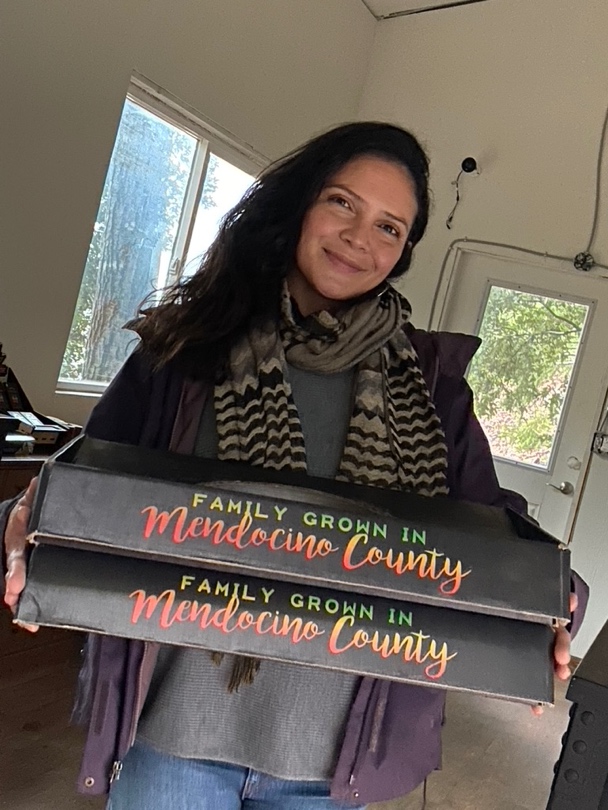 Yeins was recuperating at a hotel and farm owned by her grandparents. “Josh didn’t speak much Spanish and I didn’t speak much English, so we started out by having ice cream together. He was able to ask if I smoked, and I said, ‘Yes!’” That’s how everything started, 23 years ago.”
Yeins was recuperating at a hotel and farm owned by her grandparents. “Josh didn’t speak much Spanish and I didn’t speak much English, so we started out by having ice cream together. He was able to ask if I smoked, and I said, ‘Yes!’” That’s how everything started, 23 years ago.”
Initially, the family traveled between the US and Costa Rica for several years. “I built my first house in Costa Rica,” says Josh, a tour guide and property manager for the family’s hotel business. “We stayed there until 2007 without ever visiting the states.” Meanwhile, his buddies in Louisiana moved West. “Our family in New Orleans got flooded in 1995. It almost killed my dad, and my two buddies were getting flooded every year. Hurricane Katrina took them to Humboldt County, and they encouraged us to come to Willow Creek, which we did.”
Yeins adapted to the significant change in temperature and both braved rustic living conditions- outdoor cooking, primitive restrooms and bathing in ice melt, not unusual for entry-level cannabis workers. “We did that for three years in a row, six months at a time,” notes Josh, their story an a musing counterpunch to the notion that cannabis farmers work for three months and vacation in Costa Rica for six.
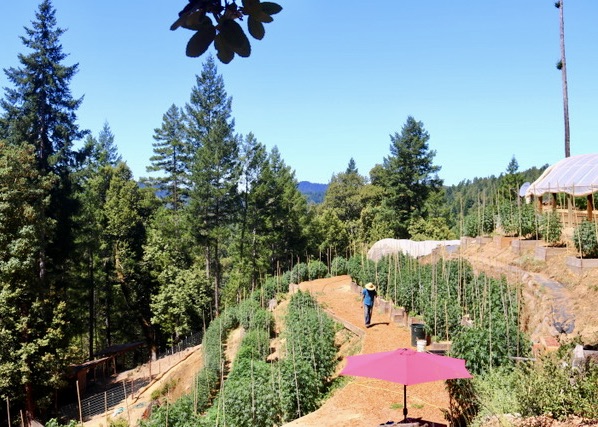 “We were really happy with our Costa Rican life, but then I saw this property,” says Josh. “The property found us,” adds Yeins. They purchased the land in 2012, and since that time built a spacious, cozy home for themselves and their 11-year-old daughter, a separate office, a drying room and large area for their goats - along with their beautiful garden. “We slept in a tent for months,” Yeins smiles.
“We were really happy with our Costa Rican life, but then I saw this property,” says Josh. “The property found us,” adds Yeins. They purchased the land in 2012, and since that time built a spacious, cozy home for themselves and their 11-year-old daughter, a separate office, a drying room and large area for their goats - along with their beautiful garden. “We slept in a tent for months,” Yeins smiles.
“Luckily, the property shares a road with a sustainable logging company. It’s made getting supplies much easier,” Josh smiles.
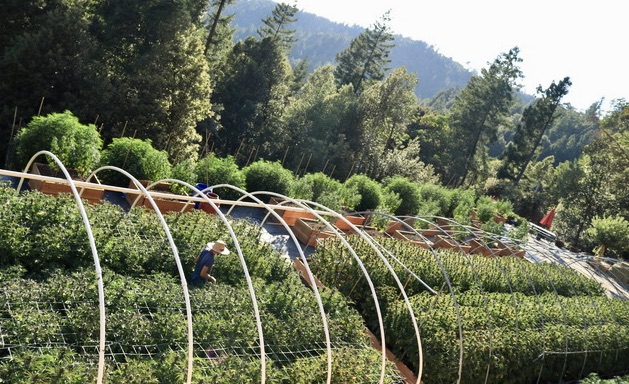 The breathtaking, hilly farm is nine miles from the ocean, which you can hear on the right day. “It’s completely terraced,” says Josh, pointing to the beautifully maintained terraces that follow the mountain’s contours. “I had been growing for personal use. Being in Humboldt increased my organic farming skills. We expanded from 50 to 188 plants, and I learned a lot during the scaling-up process.”
The breathtaking, hilly farm is nine miles from the ocean, which you can hear on the right day. “It’s completely terraced,” says Josh, pointing to the beautifully maintained terraces that follow the mountain’s contours. “I had been growing for personal use. Being in Humboldt increased my organic farming skills. We expanded from 50 to 188 plants, and I learned a lot during the scaling-up process.”
“The mountain has been very generous to us,” says Yeins.
Josh still uses the original soil that was on the property in 2007. “We’ve been amending it every year, and we’re just about biodynamic. We rake the roadsides and gather broken-down forest mulch, bringing it back to the plants and mixing it with goat manure. We also harvest pampas grass and invasive species. We have truckloads of that stuff. When we mix it with the forest compost, we get a soil analysis to see where we’re at and re-amend as necessary. Last season, we mulched with straw and alfalfa and added a mushroom cover crop. About 80% of our nitrogen comes from our goats.” The soil is so healthy, Josh has reduced amendment usage. “We probably use a third of what we were using two years ago.”
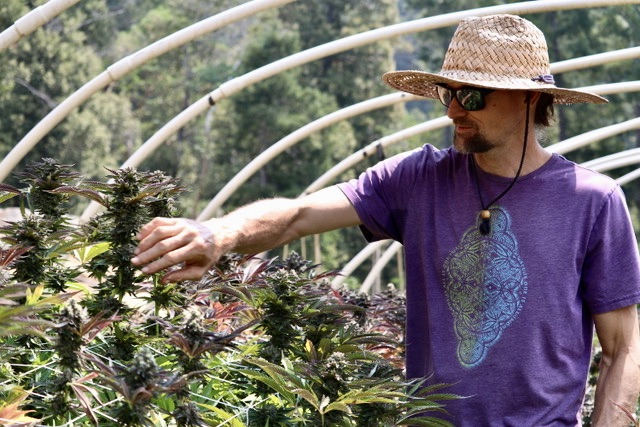 Josh does his own breeding and is drawn to landrace strains. “We took Lamb’s Bread, crossing that with Gelato Cake, creating Gelato Bread. Our KMI entry is Forbidden Muffin: Platinum Girl Scout crossed with Forbidden Fruit and Blueberry Muffin. What we don’t buy from Humboldt Seeds, we make on our own, working to elevate the THC in our personal strains.”
Josh does his own breeding and is drawn to landrace strains. “We took Lamb’s Bread, crossing that with Gelato Cake, creating Gelato Bread. Our KMI entry is Forbidden Muffin: Platinum Girl Scout crossed with Forbidden Fruit and Blueberry Muffin. What we don’t buy from Humboldt Seeds, we make on our own, working to elevate the THC in our personal strains.”
Seeing and experiencing the industry’s grittier sides motivated the couple to obtain licensure. And like their colleagues, the transition to the regulated market has been challenging.
“We started from the bottom, working with generational farmers who haven’t even started thinking about branding. We watched what happened to Humboldt- the economy, the trash, the chemical spills and the poisons on flower we’d never smoke. With regard to those issues, legalization has helped. But the way many armers have been treated while attempting to legalize is not so different as being treated like a criminal,” says Josh.
“Doing everything ourselves- our cabin, our house, building everything- makes you stronger. But having our application lost, having no access to crop insurance like other farmers, having penalties hovering over your head- I stay away from the plants, because they like being around relaxed people,” Yeins smiles. “Our days start at sunrise and end with the night shift, which is sometimes about 2:00 AM. Home schooling helps to alleviate some of the burdens.”
“If we weren’t so happy here, there’s no way we put up with the struggle. We’re hardheaded. That’s why we’re still here,” says Josh.
“I hope consumers understand it’s not in anyone’s interest supporting corporate farms. Community farmers can and do help with food security. We can switch from weed to food at any minute. Corporations never do anything soulful. Cannabis plants have allies and choose who to ally with. The plant does not ally with those who have greedy intentions,” says Josh.
“My baby daughter is 11 now,” smiles Yeins. “I’ve been sitting on the computer working on compliance while watching her grow up,” she laughs.
“All these efforts keep us here, living at our farms. We get to continue our life of freedom and peace, growing a magical plant with love, and at some point, we’ll start another adventure. As time goes on, we are more and more convinced just how extra-special this plant is,” Yeins concludes.
Lost Paradise’s KMI entry is Forbidden Muffin. Visit them on Instagram or at their website at https://www.lostparadiseorganics.com




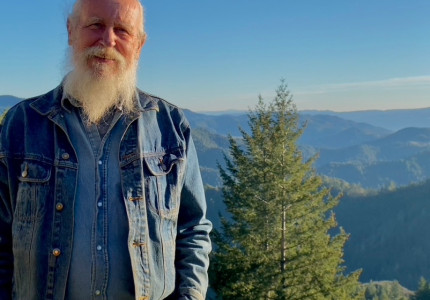
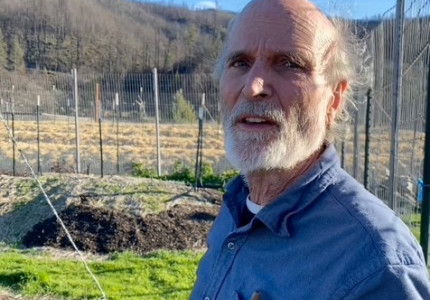
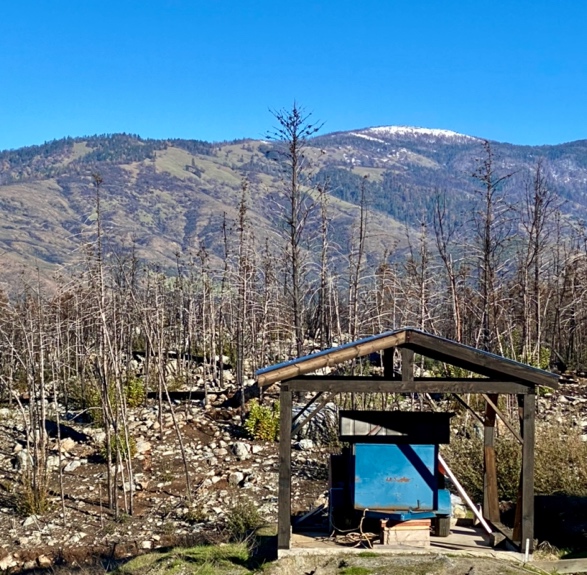 “I’ve only quit smoking three times since 1964,” he smiles.
“I’ve only quit smoking three times since 1964,” he smiles.